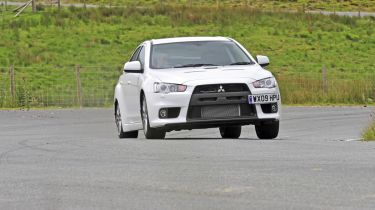Mitsubishi Evo X FQ330 SST
Legendary super-saloon remains a sensational driver’s car
Competition improves the breed – and the Mitsubishi Evolution proves it. Designed to conquer the world’s rally stages, the Japanese model has undergone constant change and improvement since its introduction way back in 1992.
Now in its 10th generation, the Mitsubishi is faster and more advanced than ever. The FQ330 we’ve lined up for this test is equipped with a more powerful version of the standard model’s 2.0-litre turbocharged engine, while the hi-tech twin-clutch gearbox has been tweaked to give smoother and faster shifts.
What hasn’t changed is the in-your-face styling. While the Evo X doesn’t turn as many heads as the Ford, it still makes a real impression. With its aggressive nose, high-rise rear spoiler, bulging wheelarches and multiple cooling ducts cut into the bonnet, it’s every inch a racer for
the road.
Climb aboard and you’ll find the cabin is much less striking. Given the car’s hefty £35,999 asking price, it’s disappointing to be greeted by low-rent plastics, cheap-
feeling switchgear and bland dashboard design. What you can’t complain about is the amount of kit fitted as standard – this includes a touchscreen sat-nav, climate control and a 30GB music hard drive.
Equally generous is the space on offer, with ample leg and headroom for all occupants. Then again, the compact boot doesn’t look nearly as large as the 400 litres Mitsubishi claims, and versatility is limited by the fact that the rear bench doesn’t fold.
Used - available now

2025 SEAT
Arona
25,255 milesManualPetrol1.0L
Cash £12,898
2023 Mercedes
GLC Coupe
36,607 milesAutomaticDiesel2.0L
Cash £28,490
2023 Kia
Sportage
9,053 milesManualPetrol1.6L
Cash £20,814
2023 Kia
Sportage
23,005 milesAutomaticPetrol1.6L
Cash £24,881However, buyers won’t feel short-changed when it comes to performance. The Evo’s 2.0-litre four-cylinder engine is the smallest here, but it punches well above its weight. At the test track, the car reaped the benefits of its clever four-wheel-drive system and SST gearbox – complete with launch control – to blast from 0-60mph in five seconds exactly. That’s a full second faster than the Subaru. It’s just a shame the powerplant has none of the character of the Impreza or Focus engines.
The unit is short on refinement, too. It sounds thrashy and strained at high revs – a problem that’s highlighted by a short top gear, which results in an intrusive drone at motorway speeds. The Evo X is at its best on tight and twisty back roads, where you can revel in the staggering agility of its chassis.
Few cars are as composed or as fast over undulating switchback roads like those on our Welsh test route. Despite having a firm ride and minimal body roll, the Mitsubishi glides over bumps and slices through bends with real poise. The steering could do with more feel, but is scalpel sharp, while the gearbox delivers rapid-fire changes that are much improved over the original.
The real genius lies in the Evo X’s sophisticated four-wheel-drive system. It shifts power seamlessly between axles and wheels, and as a result delivers incredible grip in all conditions.
This comes at a hefty price, though – the £35,999 Mitsubishi costs nearly £10,000 more than the Focus RS. It is incredibly good, but has it done enough to justify such a hefty premium?
Details
Chart position: 2
WHY: Evo X gets more power and a slicker twin-clutch box. We see if it’s still the natural selection for performance fans.







